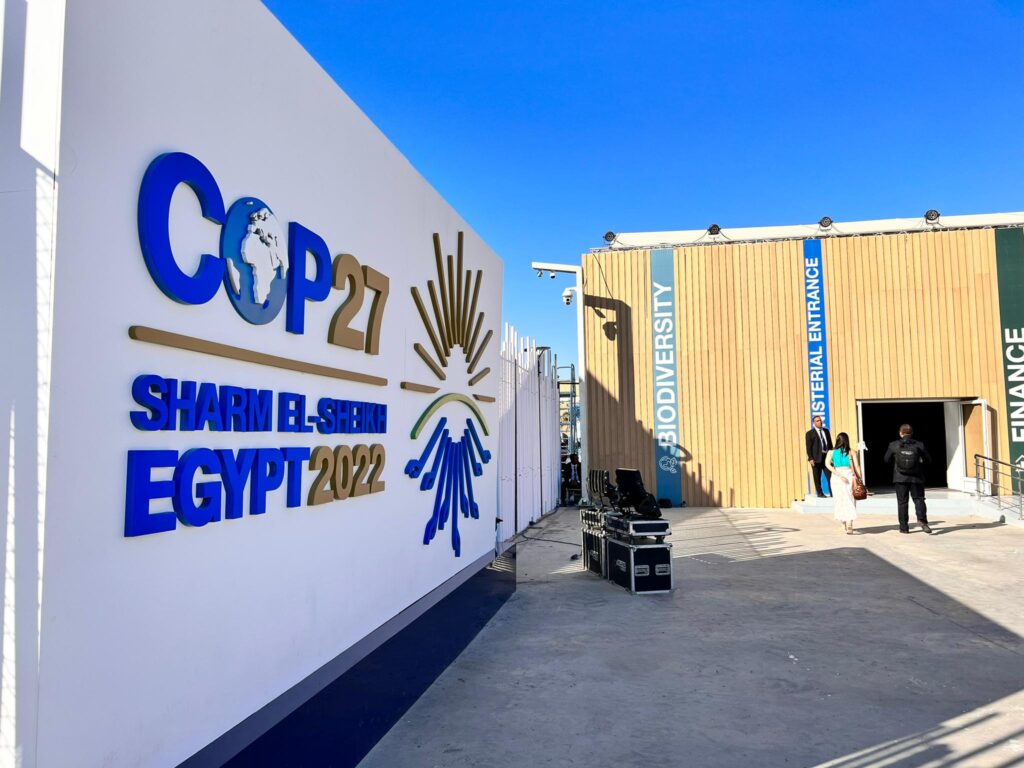17 November, 2022Although COP27 is scheduled to finish on Friday, 18 November, slow progress means negotiations are likely to continue into the weekend. The trade union delegation has focused on making sure commitments to just transition are kept.
At the time of writing, the first draft of the cover decision – the broad outline of a political statement – had been released, with many obvious gaps indicated by the word “placeholder” in the text.
COP26, held in Glasgow last year, saw a number of high profile announcements: the Just Transition Declaration, the first Just Energy Transition Partnership (JETP), and the Glasgow Climate Pact, calling on countries to submit improved targets within the year.
Billed as a COP of implementation, COP27 has seen fewer dramatic announcements, and has focused on working out the detail of previous commitments. The main areas of negotiation have been:
- Mitigation: cutting greenhouse gas emissions to limiting warming to 1.5 degrees.
- Adaptation: adapting to climate change, for instance by funding flood defenses.
- Finance: funding the transition to net zero.
- Loss and damage: compensating countries and communities for climate losses.
On most of these measures, very little progress has been made. The world needs to cut emissions by 45 per cent by 2030. Currently, we are on track to increase them by 10 per cent, and emissions hit a record high in 2022. On finance, the already insufficient US$100 billion per year committed by developed countries has never been met, and much of the finance made available has been in the form of loans.
There is also no agreement on loss and damage, with the US climate secretary John Kerry announcing that the country – responsible for 40 per cent of emissions – will not accept liability.
Unlike COP26, which was characterized by vibrant participation from civil society that took the form of an alternative COP outside the green zone, COP27 has taken place in a context of repression, with many Egyptian climate activists imprisoned and unable to participate, and delegations spied on by security officials. Trade unions have had to be careful to ensure the security of meetings.
Outside of the plenary sessions where negotiations have taken place, trade unions focused on lobbying their country delegations to include pro-worker language in the texts, as well as in ensuring practical implementation. A particular area of concern was that the term “just transition” has been coopted by many stakeholders, including corporations and countries, and used to argue that they should be compensated for decarbonization.
Union activists intervened in many sessions to insist on the correct definition of Just Transition as transition achieved through social dialogue with unions. The IndustriALL Global Union director for energy and just transition, Diana Junquera Curiel, spoke on a number of panels to reinforce this point.
Speaking at a panel with Revierwende and the German union confederation DGB, Junquera introduced the idea of global just transition agreements with companies, overseen by the UN. She also spoke on a panel with IRENA about the potential for job growth in renewables.
Unions also closely monitored the progress of the South African JETP. The first phase of this project is underway now, with the Komati power station being shut down and replaced with renewables on the same site, with no loss of jobs. The project aims to significantly reduce South Africa’s emissions by funding the shift from coal to renewables. A just transition framework is in place, and IndustriALL will monitor implementation very closely.
A US$20 billion JETP was signed with Indonesia at the G20 in Bali this week.
Diana Junquera Curiel said:
“We are going to be watching the implementation of these JETPs very closely – particularly the first live example, at Komati in South Africa. If this project is successful, with a genuine just transition for all the workers in the value chain, it will provide a pathway to climate finance that will be emulated around the world. If it fails, trust will be broken, and we will be further than ever from our goals.
“We aim to bring our Indonesian and South African affiliates together to share experiences and strategies to ensure workers are not left behind.”
